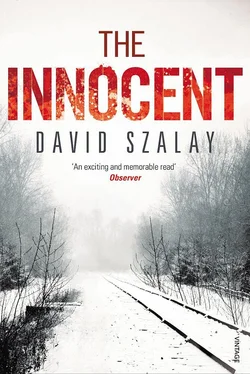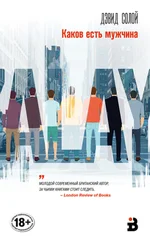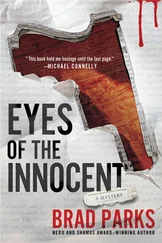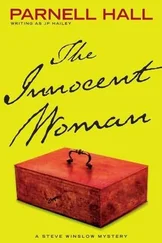Дэвид Салой - The Innocent
Здесь есть возможность читать онлайн «Дэвид Салой - The Innocent» весь текст электронной книги совершенно бесплатно (целиком полную версию без сокращений). В некоторых случаях можно слушать аудио, скачать через торрент в формате fb2 и присутствует краткое содержание. Город: London, Год выпуска: 2010, ISBN: 2010, Издательство: Vintage, Жанр: Проза, на английском языке. Описание произведения, (предисловие) а так же отзывы посетителей доступны на портале библиотеки ЛибКат.
- Название:The Innocent
- Автор:
- Издательство:Vintage
- Жанр:
- Год:2010
- Город:London
- ISBN:9781448103232
- Рейтинг книги:5 / 5. Голосов: 1
-
Избранное:Добавить в избранное
- Отзывы:
-
Ваша оценка:
- 100
- 1
- 2
- 3
- 4
- 5
The Innocent: краткое содержание, описание и аннотация
Предлагаем к чтению аннотацию, описание, краткое содержание или предисловие (зависит от того, что написал сам автор книги «The Innocent»). Если вы не нашли необходимую информацию о книге — напишите в комментариях, мы постараемся отыскать её.
The Innocent — читать онлайн бесплатно полную книгу (весь текст) целиком
Ниже представлен текст книги, разбитый по страницам. Система сохранения места последней прочитанной страницы, позволяет с удобством читать онлайн бесплатно книгу «The Innocent», без необходимости каждый раз заново искать на чём Вы остановились. Поставьте закладку, и сможете в любой момент перейти на страницу, на которой закончили чтение.
Интервал:
Закладка:
‘I see. Well please don’t do that if we see one today.’
She laughed.
The forest had a strangely empty look. The narrow trunks of the pines were as straight as pencils, the only branches higher up, where there was sunlight. They were walking on fallen pine needles – epochs of them, as she pointed out – and it was like walking on a mattress.
He told her that he was originally from a village, and had lived there until he was twelve. ‘I’ve forgotten almost everything about it now.’
‘Forgotten what?’
‘For instance, how to milk a cow. When I was a child I had to help my parents with the milking.’
She seemed uninterested, and lit a papirosa.
The path went straight up an ivy-covered slope. Initially, he mistook the sound of water for the wind. Only when the wind stopped, and the whole forest stood very still for a moment, did he understand that what he was hearing was water – an unvarying high soft sound. And then, quite suddenly, unmistakably watery. In the shifting shade under the trees, the stream flowed down a natural stairway of stones, shallow pools perpetually overflowing. The air was empty, pure. The shadows had the frigidity of early spring. From an open space they were able to turn and see the lake in its valley, and the monumental clouds mirrored in its surface, which was perfectly still. The soil was waterlogged, and soaked through the seat of his trousers.
They walked slowly down. It was mid-afternoon, warm and sleepy, when her house was visible through the trees at the end of its short path. He waited on the wooden steps for her to unlock the door. ‘Oh I forgot to lock it,’ she said. She opened it and went in. Immediately he heard Lozovsky’s voice – ‘Nadya? Have you seen the Chekist?’ The impersonal tone of this hurt his feelings. He had been there, living with them, for more than a week. ‘Oh, you’re here,’ Lozovsky said. It was quite dark inside the house. Lozovsky was smiling. ‘Well, good news,’ he said.
‘What’s that?’
‘The line’s open.’
‘The line?’
‘The railway line.’
‘What, already?’
‘We got a telegram an hour ago.’ He lit the unlit papirosa that he was holding. ‘The train will be through at the usual time today. You don’t look very pleased,’ he said, through the smoke.
‘Of course I’m pleased.’
Sitting at his desk, staring at the typewriter, he is suddenly aware of the spectral thunder of a jet. A vapour trail is visible in the sky. The plane itself is not visible. Silently, in the stratosphere, the trail disperses. He spends very little time away from his flat. A fortnight in the Crimea every summer, a KGB sanatorium on the sea. Swimming in the hot sulphurous pools. Perhaps an excursion to the Nikitsky Botanical Gardens in Yalta. That’s all. And even that seems too much – especially when he has to pack his small suitcase, and sit waiting for the loud honk of the bus when it stops in front of the house. Unhappy, silent, slightly lost, he takes his seat among the others, in their short-sleeved shirts and sunglasses, and slowly they wind through the eastern suburbs of the city. Then out to Koltsovo. He first flew in a plane the year Gagarin went to space. That flight, like all the others he has made since, was between Sverdlovsk and Simferopol. In the years before that they would spend several days on the train, slowly leaving the stress of their work, which they never talked about, while the shadows of trees flickered on their sleeping faces. The vapour trail has dispersed. The sky’s mineral blue is intact. He sits down at his desk and stares at the words he has typed.
6
SPRING HAD TRANSFORMED the forest. Nor was the hospital, an inelegant weather-stained neo-classical pile, quite like my memory of it. Since it had been demilitarised in 1947, we needed the director’s permission if we wanted to take one of the patients. There was a form he needed to sign, known as a form four-eighty. This Lozovsky would not do. He would not sign it. Having vouched for him in Mikhalkov’s office only forty-eight hours earlier, I found I took this personally. I sighed. I said, ‘Mikhail Naumovich, I feel we know each other, if only slightly, and I want to be open with you.’ He was obviously upset, though he tried not to show it. ‘They want a second medical opinion,’ I said. ‘There are things that aren’t easy to understand if you haven’t met him. The writing in particular. You know that. It’s why you didn’t tell me about it yourself.’ He said nothing and lit a papirosa. ‘I understand why they want a second opinion,’ I said. ‘I hope you do as well.’
‘Does it matter?’
‘Does what matter?’
‘Does it matter whether I understand?’
‘I hope you do.’
‘Then let’s say I do.’
The next morning, when I went to his office for the form, he said he had not signed it yet, he wanted to look at it first. This seemed odd, since he must have seen many like it in the past. Nevertheless, I said, ‘Of course,’ and sat down on the old leather sofa. He spent a long time looking at the form. Finally he said, ‘No, I can’t sign this.’
‘Why not?’
‘Have you read it?’
‘Yes.’
‘So you must understand.’
‘Understand what?’
‘Well I think it’s quite obvious …’
‘Just sign it, please.’
For several seconds he said nothing. Then: ‘No. It wants me to state that the patient is mentally and physically fit to be transported, and to face interrogation, and a trial. And he isn’t.’
When he had said this, in a quiet voice, he stared at me. He was even smiling slightly. I think I knew then that he would never sign the form. I saw the stubbornness in his eyes. And what stubbornness! He was a man who in an earlier time would have died at the stake out of sheer stubbornness and vanity. Still, I tried to persuade him.
‘They want a second opinion,’ I said. ‘A second medical opinion. You can understand that, surely?’
‘Then let them send someone here.’
‘No. They won’t do that.’
When he just sat there, staring at me, I stood up and went to the window, wondering what to do. ‘I’ll make a note,’ I said, ‘of your objections to this. Your purely medical objections. I’ll also allow Doctor Anichkova to accompany Yudin. To make sure he’s okay. Strictly speaking it’s not allowed …’ Lozovsky said nothing. ‘Okay?’
‘That’s not the point.’
‘What isn’t?’
‘It doesn’t matter whether Anichkova goes with him or not. What difference does that make?’
‘Well you’re worried about his welfare, aren’t you?’ I shouted. ‘I assume that’s what you’re worried about.’
‘Yes, it is …’
‘And do you really think your not signing this form will help him?’
‘I don’t know,’ he said. ‘I know that signing it wouldn’t.’
‘You’re wrong. What do you think will happen if you don’t sign it?’
‘I don’t know …’
‘Then I’ll tell you! It won’t make any difference! Not for him.’
He did not like being shouted at.
‘Look,’ I said. ‘I understand why you’re opposed to this. I’ll do everything possible to make sure he’s okay. You have my word. It’s just for a second opinion. So sign it. Please.’ He did not move. There was a long silence. I said, ‘I’m leaving later this afternoon. I hope – I do hope – you’ll have signed it by then.’
He had not, which saddened me. Though many people would not have, I liked Lozovsky. The first time I was there, he and his wife were very kind to me. I was there for so long that I started to feel like part of the family. They made an effort to make me feel at home, and I helped in whatever ways were needed. I sawed logs for firewood, fetched water from the well. His wife was younger than he was. In fact, she had been one of his pupils at the Second Medical Institute in Moscow. They were handsome, intelligent people. We ate together in the evenings, and talked. There was usually an element of friendly sparring to these talks – with Lozovsky that was inevitable. Often he and I played chess. He was a strong player. We were evenly matched, I would say. Sometimes he played the piano. There was a piano in their little wooden house, an imported German upright, looking very out of place in the forest. He told me one evening how it had been transported there, on a horse-drawn wagon through knee-deep mud. He said he had wanted to be a professional musician. He wasn’t talented enough. To me he seemed very talented. I have a memory, in particular, of his playing the A major prelude from the second book of the ‘Well-tempered Clavier’ – those preludes and fugues were what he usually played – a memory of an evening in the wet forest, and that sad, placid music.
Читать дальшеИнтервал:
Закладка:
Похожие книги на «The Innocent»
Представляем Вашему вниманию похожие книги на «The Innocent» списком для выбора. Мы отобрали схожую по названию и смыслу литературу в надежде предоставить читателям больше вариантов отыскать новые, интересные, ещё непрочитанные произведения.
Обсуждение, отзывы о книге «The Innocent» и просто собственные мнения читателей. Оставьте ваши комментарии, напишите, что Вы думаете о произведении, его смысле или главных героях. Укажите что конкретно понравилось, а что нет, и почему Вы так считаете.












